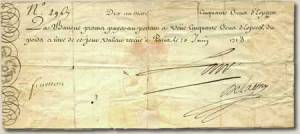I grew up in south Mississippi as a twelve-year student of the Ocean Springs School District. I’m grateful for the excellent education given to me there. As early as third grade I was required to study a foreign language (I chose Spanish); at some point I was also introduced to the formal study of Mississippi history, which fascinated me. There I learned one of my earliest lessons in economics–in addition to those being taught to me at home by my father who was a banker. I remember to this day the lessons learned in history class while studying an event known as “the Mississippi Bubble.”
With the arrival in “Biloxey” (now spelled “Biloxi“) of the explorer Pierre LeMoyne d’Iberville in 1699, the French laid claim to a massive amount of land in what would one day be called the United States of America. It stretched from Louisiana to Newfoundland and included territory on both sides of the Mississippi River. You don’t need much creativity to imagine the financial steam that this discovery brought to France. Powerful people with connections to the French monarchy were quick to line up for a piece of the economic pie. You see, some things in history are fairly constant. One of those constants is the sycophancy of influential people who make a better-than-average living from their relations with powerful people in government.
It’s an incredible tale that includes many of the same elements being debated today: fiat paper money, greed, monopolies, Keynesian economics, powerful government, and little benefit to most citizens. If you want to read all the interesting details for yourself (and I certainly recommend that you do so), read the 2012 article by Forbes economist Jesse Colombo, located HERE.
To keep the story to essentials, let me give you a quick review. It seems that a powerful Frenchman of the early 18th century was in dire need of cash. To remedy the situation he turned to a Scottish financier then visiting France, a man named John Law, who introduced the French to a new concept. Rather than trading with precious metals like gold and silver, he suggested to them that a bank should be established by royal decree and that this bank should issue money made of paper. The paper, of course, was of no value except for the promise it carried to its bearer. We now know such money by the name of “fiat” currency, from the Latin word fiat, meaning “let it be done” (the “it” in this case is the assignment of monetary value to something that has no such value except by way of promise and expectation).
A tremendous rush of money began as people sought to capitalize on land in the New World. Law became amazingly wealthy, in cash and in power. He had the power to mint coinage and collect taxes. He had the trust of some of Europe’s most powerful people. He purchased an ailing institution known as the Mississippi Company, gave it a new name and sold shares that expanded in price at an unsustainable rate. The French crown pumped money into his scheme and so many people profited that the French term millionnaire came into vogue.
Eventually, cooler minds began to wonder about the wisdom of investments that skyrocket at such impressive levels while fueled by government-approved fiat money. Confidence faded. Investors demanded gold rather than paper and the entire scheme began to collapse. Company shares were drastically reduced and the millions earned became millions lost. The so-called “bubble” (Colombo says it’s better described as a series of “failed monetary policies“) was a product of excessive monetary growth. In other words, there was an explosion of money but not necessarily of value. In the end, the value of the money declined and inflation set it.
I’ll leave it to my dear readers to discover parallels to today’s world. In the last few months there has been an increase of voices reminding us that all bubbles eventually burst. And economic bubbles always rise higher and faster when inflated with easy government money. Time will tell.

http://foreignpolicy.com/2015/05/28/china-stock-market-shanghai-composite-index-plunge-media-bubble/
John, the answer to your question is happening right now in China, the above link germane with appropriate acknowledgement to Foreign Policy magazine. A trifecta of ignorant investors, lack of transparency, and disregard for whatever law does exist by everyone including all levels of the government has created a breathtaking financial roller coaster that only the hardened Chinese gamblers could endure. I really recommend reading the article as a cautionary lesson.
Capn Nick
Thanks. I will read it, for sure!